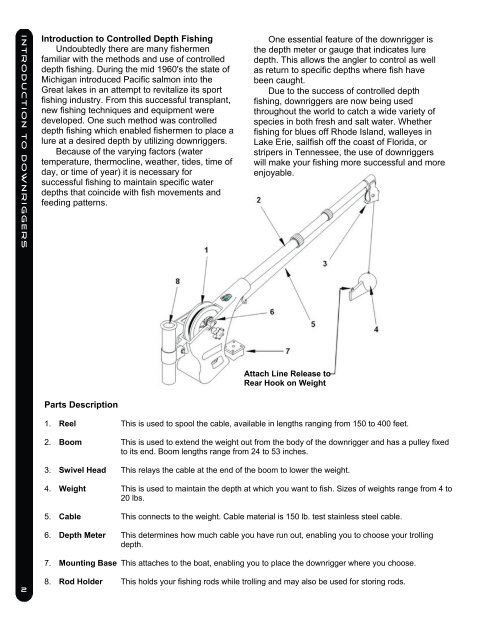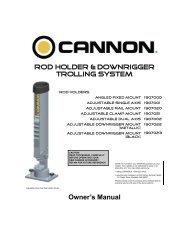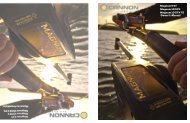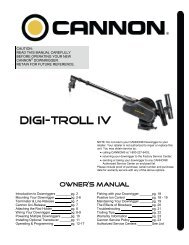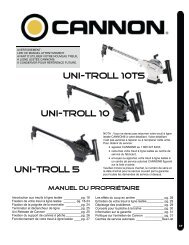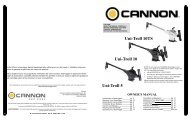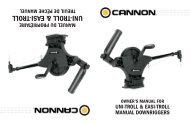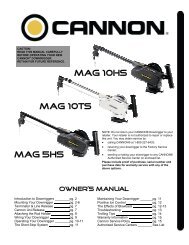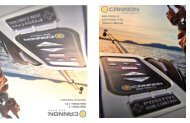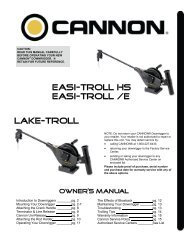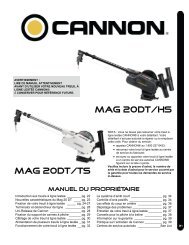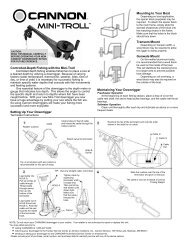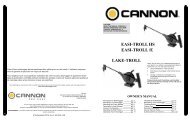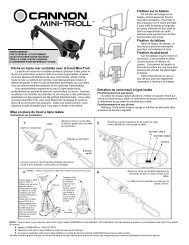Mag 20DT/HS Manual - Cannon Downriggers
Mag 20DT/HS Manual - Cannon Downriggers
Mag 20DT/HS Manual - Cannon Downriggers
Create successful ePaper yourself
Turn your PDF publications into a flip-book with our unique Google optimized e-Paper software.
Introduction to downriggers<br />
Introduction to Controlled Depth Fishing<br />
Undoubtedly there are many fishermen<br />
familiar with the methods and use of controlled<br />
depth fishing. During the mid 1960's the state of<br />
Michigan introduced Pacific salmon into the<br />
Great lakes in an attempt to revitalize its sport<br />
fishing industry. From this successful transplant,<br />
new fishing techniques and equipment were<br />
developed. One such method was controlled<br />
depth fishing which enabled fishermen to place a<br />
lure at a desired depth by utilizing downriggers.<br />
Because of the varying factors (water<br />
temperature, thermocline, weather, tides, time of<br />
day, or time of year) it is necessary for<br />
successful fishing to maintain specific water<br />
depths that coincide with fish movements and<br />
feeding patterns.<br />
One essential feature of the downrigger is<br />
the depth meter or gauge that indicates lure<br />
depth. This allows the angler to control as well<br />
as return to specific depths where fish have<br />
been caught.<br />
Due to the success of controlled depth<br />
fishing, downriggers are now being used<br />
throughout the world to catch a wide variety of<br />
species in both fresh and salt water. Whether<br />
fishing for blues off Rhode Island, walleyes in<br />
Lake Erie, sailfish off the coast of Florida, or<br />
stripers in Tennessee, the use of downriggers<br />
will make your fishing more successful and more<br />
enjoyable.<br />
Attach Line Release to<br />
Rear Hook on Weight<br />
Parts Description<br />
1. Reel This is used to spool the cable, available in lengths ranging from 150 to 400 feet.<br />
2. Boom This is used to extend the weight out from the body of the downrigger and has a pulley fixed<br />
to its end. Boom lengths range from 24 to 53 inches.<br />
3. Swivel Head This relays the cable at the end of the boom to lower the weight.<br />
4. Weight This is used to maintain the depth at which you want to fish. Sizes of weights range from 4 to<br />
20 lbs.<br />
5. Cable This connects to the weight. Cable material is 150 lb. test stainless steel cable.<br />
6. Depth Meter This determines how much cable you have run out, enabling you to choose your trolling<br />
depth.<br />
7. Mounting Base This attaches to the boat, enabling you to place the downrigger where you choose.<br />
2<br />
8. Rod Holder This holds your fishing rods while trolling and may also be used for storing rods.


